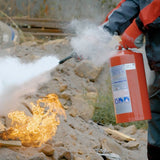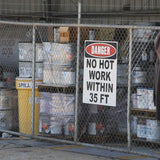Fire Prevention for Shipyard and Marine Terminals
Fire prevention in shipyard environments is essential for protecting workers, equipment, and overall operations. The combination of flammable materials, high-heat activities, and confined spaces makes shipyards particularly vulnerable to fire hazards. Without proper precautions, sparks from welding, improper storage of flammable liquids, or faulty electrical wiring can quickly lead to dangerous fires. Understanding these risks and taking proactive measures is key to maintaining a safe work environment.
Fires thrive when fuel, oxygen, and heat interact, creating a chain reaction known as the fire tetrahedron. In shipyards, potential fuel sources include hazardous chemicals, cargo residues, and combustible dust, while heat often comes from welding, grinding, and electrical equipment. Strict fire prevention measures, such as maintaining clean workspaces, properly storing flammable materials, and routinely inspecting equipment, help minimize these risks. Hot work operations require extra precautions, including permits, fire-resistant barriers, and fire watches to monitor for lingering hazards.
Preparation is just as important as prevention. Workers must be trained to recognize fire hazards, respond swiftly to emergencies, and properly operate fire extinguishers. Early reporting of unsafe conditions, such as damaged wiring or leaking fuel, can stop fires before they start. Additionally, shipyards should maintain fire suppression systems, ensuring rapid containment in case of an emergency. A strong fire prevention strategy is more than a regulatory requirement—it’s a commitment to safeguarding lives, assets, and the integrity of maritime operations. Length: 17 minutes
Topics Include:
- Introduction to Fire Prevention
- Basic Components of Fire
- Fire Hazards
- Controlling Fire Hazards
- Reporting Unsafe Conditions
- Fire Extinguisher Use
- Emergency Response
Sku: MOX-MAR-Shipyard-Fire






